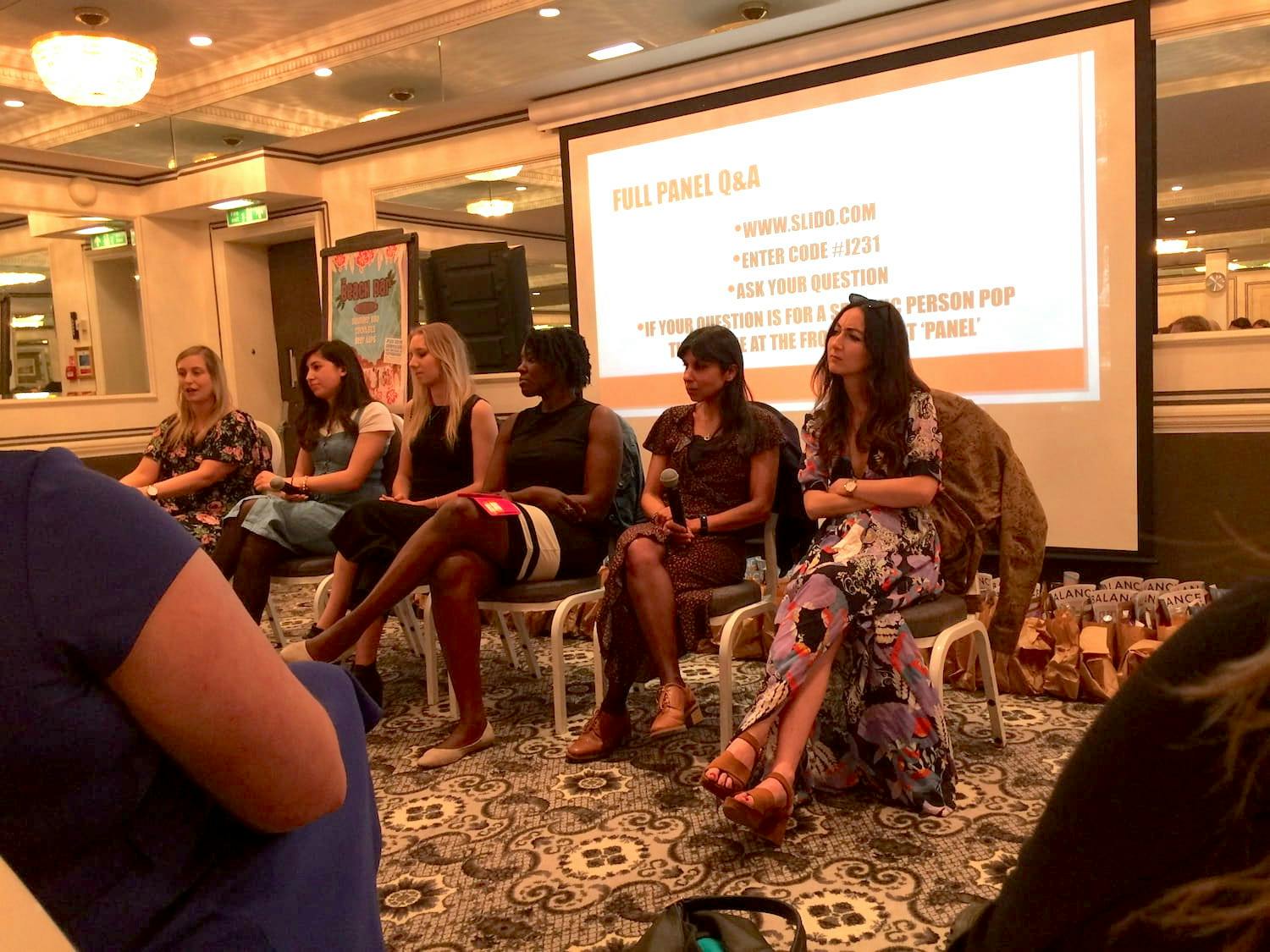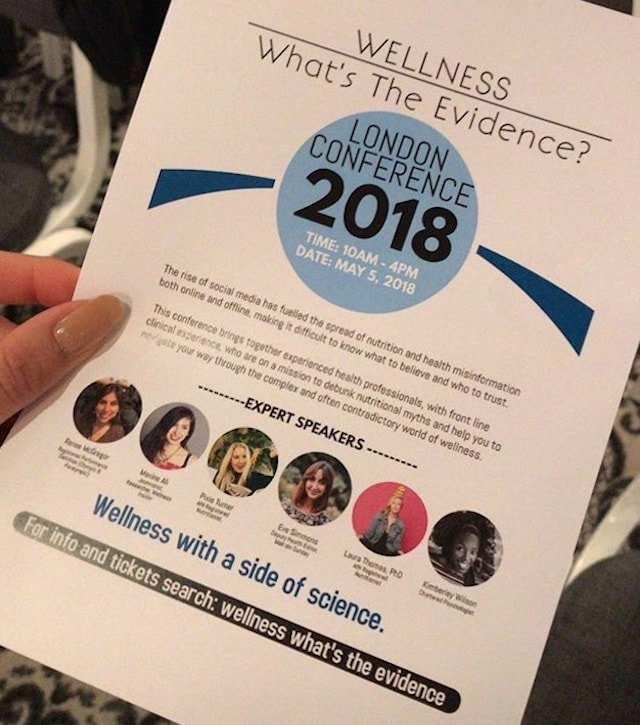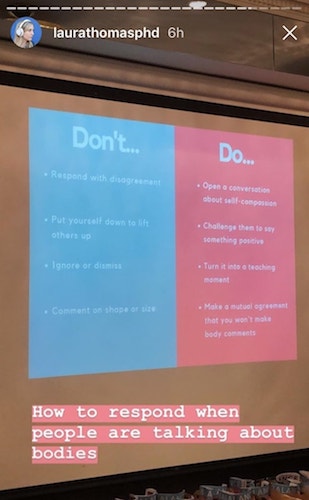
Six experts on a mission to debunk nutritional myths and help us navigate our way through the complex and often contradictory world of wellness
The world of wellness seems to be an ever-expanding one. Our interest in our health, our bodies and our mind is astounding and yet, much of the information available is convoluted. Confused and overwhelmed, how are we supposed to know the answer?
Working at Happiful, I’m very much aware of the impact social media can have on our lives. We are surrounded by information, and when influencers are posting these seemingly perfect lives, we begin to question our own choices. I’ve been there, and I’m sure I’m not the only one. So when I saw this event advertised, I bought a ticket without hesitation.
What was it?
The conference was hosted by the brilliant Kimberley Wilson, a Chartered Psychologist and governor of the world-renowned Tavistock & Portman Mental Health Trust, who specialises in food psychology (you may also recognise her from a certain baking competition…).

With the rise of social media fuelling the spread of nutrition and health misinformation, both online and offline, it’s become even more difficult to know who to trust and what to believe. We need the truth and we need the evidence to back it up. We need information.
So on Saturday 5 May, Kimberley and five other experienced health professionals - who are each on a mission to “debunk nutritional myths” - came together to help us navigate our way through the “complex and often contradictory world of wellness” and as a result, help others too.
After a hot drink and a quick hello to the people beside me, Kimberley kicked off the event with an introduction of what to expect from the day: “So why are we here, why have I asked you to give up your Saturday, this lovely day in May? It’s because 90% of young people believe the health information that they read on social media.”
Kimberley continued, “I’m a psychologist and I have this growing experience of people coming in, and having anxieties about food, about eating, being worried about body shape, concerns about whether they’re normal. And when I ask them where these ideas have come from, they will tell me that they’ve read it somewhere on a blog, or on social media, and it’s kind of terrifying and infuriating."
Such a devastating statistic.
— Tome Levi (@TomeLevi) May 5, 2018
Please check for credentials. Online fame does not a qualification make. #wwte #wellness pic.twitter.com/cyVeZej1Z8
“I sit there with one person at a time trying to explain, ‘that’s not true, that’s not how it works, that’s not about you, you’re completely different’ and it got to the point where I was really frustrated myself and was also talking to colleagues and finding that they had the same frustrations and I thought, ‘well we can sit and whine about it or we can try and do something about it’.
“I want to let people know that there are professionals who care about this stuff and are invested in people having good information and trying to get that message out. So that’s why you’re all here,” Kimberley said.
The speakers
Pixie Turner (@plantbasedpixie)
The opening presentation was held by nutritionist, food blogger and author, Pixie Turner. Graduating with a First Class degree in Biochemistry and a Masters in Nutrition, Pixie took us through some of the common nutrition myths that have, in recent years, thrived in the wellness world, and gave us tips on how to protect ourselves from the “endless tide of ‘nutribollocks’”.
One topic Pixie spoke about was superfoods: “superfoods are foods with PR teams. ‘Superfood’ is a marketing term - in 2007 there was a rule that came in that if you are to put ‘superfood’ on packaging you must follow it up with a justification for it - but is still not considered to be a scientific term.
“Maca for example, is supposed to give you energy, it doesn’t. It’s supposed to be an aphrodisiac, it might be but the evidence shows it’s too soon to tell, and it’s supposed to be an adaptogen, which is not a real thing.
“But it doesn’t give you energy, so if you like maca, or have been taking it for whatever reason, have coffee. Coffee is a wonderful thing that will give you energy. Also the best thing that will give you energy is food. Food is energy.”
Eve Simmons (@eviesimm)
Eve is a writer, journalist and eating disorder campaigner. Currently deputy health editor of the Mail on Sunday and co-editor of the website, Not Plant Based, a website dedicated to alleviating food anxieties, fighting food and health myths and encouraging us to celebrate all foods, Eve knows all too well the secrets of journalism and how the media can perhaps, misinform readers.
In her talk, Eve spoke of her own experience of writing about health, and how to decipher the often-utterly confusing tangle that is wellness in the media.
Her advice? Instead of reading just one or two online articles, read it all - online, offline, newspapers, books, blogs - the key to understanding the truth is to read as much as you can and question everything.
Maxine Ali (@maxineali)
Writer, journalist and linguist, Maxine dedicates her time to dismantling the damaging language we use around food and bodies, and showing that there is so much more to health than appearance. A fascinating talk on a rare topic, Maxine spoke about the words that influence our body image and the long-term effects this language can have on ourselves and the people around us.
“I studied Linguistics for my Undergraduate degree and I’m currently doing a Masters, and I wanted to know why specifically the way I was writing about language was influencing the way I perceived my body.
“I noticed this everywhere, everywhere I went, everyone was suddenly talking about bodies. I was in the coffee shop and there was people commenting on whatever diet they were on, I was watching TV and someone was talking about how they lost weight.
“I thought, something’s not going right. So I started looking into body dysmorphia and language. One thing I noticed is that we have a script about our bodies. We speak in really similar ways, and you can look around the room and you can see we all look wildly different, we all have unique characteristics, and yet we talk about our bodies in the same way.

“There’s a lot of interest in the media about body image and how images influence us with Photoshop, but because language is so abstract, nothing has changed.”
Laura Thomas (@laurathomasphd)
Having met Laura previously, I had an idea of what to expect from her presentation. A Registered Nutritionist specialising in Intuitive Eating, weight inclusive and non-diet nutrition, Laura is passionate about educating people and helping them understand their bodies. When not editing her upcoming book, she hosts the podcast Don’t Salt My Game and can be found calling out “nutrition and diet culture BS” on Instagram.
Laura spoke to us about the concept and practise of Intuitive Eating, a way of eating that is based on breaking away from diet culture and food rules, and instead recognising and responding to our internal cues, such as hunger, satiety and appetite.
“Intuitive eating is an evidence-based intervention designed to help people move from external, rigid rules and draw them back into their bodies.
“Diet rules consume our minds, it takes over and we’re all constantly thinking about how our body looks, but we can’t actually experience being in our bodies. And that’s a problem because it disconnects us with our innate ability to regulate our feeding. It disconnects us from our hunger and our fullness signals, and also what feels good when we eat it.
“We’re really out of touch with our hunger - magazines love to pathologise hunger, and always tell us how to pacify our hunger, but what if we’re just hungry?”
You can learn more about Laura and Intuitive Eating in our July issue, coming soon.
Kimberley Wilson (@foodandpsych)
Kimberley, the star of the show, is a Chartered Psychologist who specialises in food psychology. Her Harley Street practice, Monumental Health, takes a functional medicine approach to mental health, combining the latest research and principles of Nutritional Neuroscience and Nutritional Psychiatry with evidence-based psychological therapy to provide a complete, total health approach to mental health.
Kimberley spoke about the psychology of food, including the social, psychological and biological factors that influence food choice and how food shapes our identity.
“I’m starting to see a lot of people with food anxieties justifying their worries with misinformation that they have seen somewhere, on a blog, on social media… and I’m having to spend an awful lot of time to factually debunk these things, before even getting into the psychological side of it, which is taking more and more time.”
Within her presentation, she included a quote from Sean Parker, former President of Facebook: “The thought process in building these applications, Facebook being the first of them, was all about ‘how do we consume as much of your time and conscious attention as possible?’
“It’s a social validation feedback loop, exactly the kind of thing a hacker like myself would come up with because you’re exploiting a vulnerability in human psychology.”
Kimberley responded: “So this is where I become interested. As a psychologist, I become interested in how much time my clients - young or old - are spending on social media. Because it makes a difference to their capacity to think, to concentrate, their attention, but also how they start to see themselves.”
Renee McGregor (@r_mcgregor)
A leading dietitian and performance and eating disorder specialist, Renee has over 15 years’ experience working in nutrition, primarily working with elite athletes, coaches and sport science teams. She currently the nutrition lead for Anorexia and Bulimia Care, and a member of the International Task Force for Orthorexia, a programme working towards having the condition medically recognised as an eating disorder.
As you can imagine, Renee’s talk was pretty intense. Titled ‘The Truth About Health Eating and the Diet Industry’ Renee explored what constitutes a healthy diet and what happens when healthy eating goes bad.
“So what does it mean to be healthy in 2018?” She asked us. “Apparently, you’re meant to possess an Instagram account, and all these hashtags; #wellness, #fitspo #clean.
“So what do we know about nutrition? Apparently, two of the top ‘healthy food’ Instagram accounts are these; Deliciously Ella and Raw Vegan Blond. And you know what? Neither of them have a single nutritional qualification between them.”
Renee previously wrote for us, in Orthorexia: Is Clean Eating Making You Unwell?
Fantastic day with these amazing people - great talks! @plantbasedpixie @notplantbased @maxineali_ @laurathomasphd @FoodAndPsych @mcgregor_renee #WWTE pic.twitter.com/O6YS0fZ7eZ
— Isabel Butler (@PumpkinIz) May 5, 2018
This event was truly wonderful and so fascinating. Coming from a background in mental health, I had an idea of the impact of social media and how misinformation can affect our wellbeing, but this opened my eyes to so much more, about myself and society in general.
During the full panel Q&A at the end, one person from the audience asked:
“While I understand the aim of conferences like this, the audience here I assume have a small idea already of the topics being discussed today - how can we spread this information to the general public, who perhaps are yet to even know the information they are consuming is potentially dangerous?”
The answer? To keep talking, reading and sharing. The discussion needs to be had. Direct friends and family to professionals, like the ones mentioned above, to learn more about the impact this information is having on our health. Write articles, make films. Call out those who are misinforming people and challenge the diets that you see everyday. Only through speaking out, will we be able to reach the masses, even it’s just one person at a time.
For mental health support and to find a counsellor near you, visit Counselling Directory.
For nutritional support from qualified professionals, visit Nutritionist Resource.

